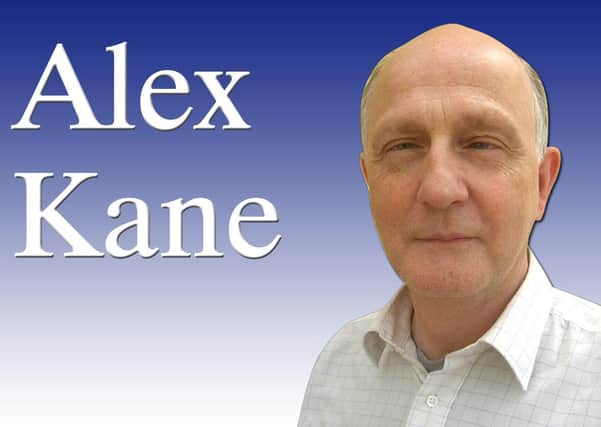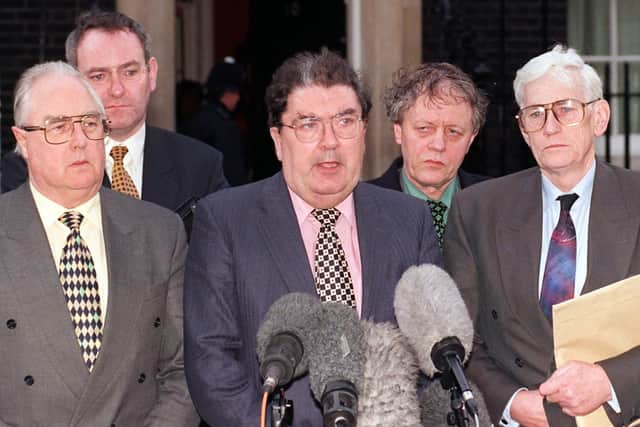Alex Kane: John Hume’s influence and fingerprints are everywhere


Addressing the former Stormont parliament on June 23, 1971 – in a three-day debate marking its 50th anniversary – Hume, deputy leader of the new SDLP, said: “It should be made clear to all people today who say that no change has taken place that this is simply not true. There have been changes in this community and there must be more changes, but it takes time before legislative changes become reality in the lives of the people and, if people interfere in the progress of that change by violence then they can only increase the frustration ... progress is not in a straight line but progress is taking place...the choice we face today is a very serious one and it can be expressed very simply – chaos or community.”
Brian Faulkner – in his autobiography, Memoirs of a Statesman – said of Hume’s speech: ‘Although he went on to talk of the failure of partition ... he made a spirited denunciation of terrorism ... and I was generally pleased with this response from a person regarded at that time by unionists as one of the most intransigent and bitter opponents of the State.’
Advertisement
Hide AdAdvertisement
Hide AdWriting about the Sunningdale negotiations two years later, Faulkner cited Hume (whom he described as ‘a formidable political thinker with great personal integrity but a sometimes exasperating dogmatism) as a sticking point when it came to issues like police reform, detention, reform of the civil service, the Council of Ireland and the make-up of the new Executive.


Some observers argue that Hume deliberately pushed the SDLP in a ‘greener’ direction when he became leader in 1979 because he never forgave unionism (endorsed by an overall electoral majority in the February 1974 general election) for destroying Sunningdale. Yet Faulkner’s earlier description is of a man who was already regarded by unionists as a bitter opponent; a man who was also instrumental in ensuring that there would be no wriggle room on the Council of Ireland – the single issue which galvanised majority unionist opposition to Sunningdale.
It tends to be forgotten now that the Ulster Unionist Council – by a substantial majority – supported the White Paper in autumn 1972 which recommended a power-sharing Assembly as a replacement for the prorogued parliament. It also tends to be forgotten that Faulkner took huge personal/political risks to ensure a pro-White Paper unionist majority in the 1973 Assembly election. He put his leadership and career on the line for an agreement with the SDLP and yet evidence suggests that Hume was key to ensuring that, right at the heart of the agreement, were the planted seeds of its inevitable destruction.
Frank Millar – former general secretary of the UUP, later the London editor of the Irish Times and one of the shrewdest ever observers of unionism – wrote, in 2004: ‘It was only gradually in the late 1980s that some unionist politicians began to draw the succour and encouragement they could from the SDLP’s consistent stand against IRA violence, and John Hume’s repeated assertion that there was no state of injustice to justify the taking of a single life in Northern Ireland. Yet there was also deep and enduring distrust of Hume. Unionists generally believed that for him it must be a “united Ireland or nothing” and would invariably interpret his talk after Bloody Sunday 1972 of an “agreed Ireland” as code for unity by other means.’
Advertisement
Hide AdAdvertisement
Hide AdMy lasting impression of Hume is that he was never particularly interested in unionism or of an ‘agreed’ Northern Ireland. And I’m not sure he ever was. He was unambiguous in his opposition to violence as a strategy to achieve a united Ireland; and ferocious in his condemnation of the IRA. I admired him for that approach. He was, in the truest sense of the term, a moral man.
Yet his approach to unionism never made sense to me, for how could he hope to embrace unionists within his proposed ‘agreed’ Ireland when he seemed to find it so difficult to establish, let alone sustain, a relationship/dialogue with the key players.
I’m not, by the way, suggesting that he disliked, let alone hated unionists. I have heard Faulkner, Ian Paisley, John Taylor, Jim Nicholson, Reg Empey, David Trimble and others talk warmly of him; yet I have never heard any significant player within unionism make a convincing case that he was even remotely interested in building an ‘internal’ relationship with unionism. Sunningdale, the Anglo-Irish Agreement and the Good Friday Agreement were always transition phases for him – temporary means to another long term end.
That said, unionism should have tried to engage him. It should also have countered his campaigns in Brussels, London, Dublin and Washington, where, for 30 years, he bent ears like nobody’s business. What he said over and over and over again since he was first elected to Stormont in 1969 (and there was an early echo of it in June 1971) was often mocked as his ‘single transferable speech’; yet it worked.
Advertisement
Hide AdAdvertisement
Hide AdI remember hearing a former CEO of Coca-Cola making a point about branding: ‘It may be the best known drink brand in the world, but we know that there’s always someone, somewhere, who doesn’t know the name, so our job is to constantly promote the brand and then continue to remind old and new target audiences.’
That was Hume’s approach to his ‘agreed’ Ireland. And it is a tribute to his relentless messaging that, even with successive UK governments, and with leaderships in Dublin, Brussels and the White House (along with celebrity endorsements from politics/show business/media) the key elements of the single transferable speech found their way into official policy, public statements and assorted initiatives.
He is rightly described as a giant of Irish politics. His influence and fingerprints are everywhere. It is astonishing, truly astonishing actually, to note that he had more specific, lasting influence on Downing Street policy than any unionist leader I can think of.
He achieved this pre-eminence by democratic methods alone. He was always my political/constitutional opponent yet, in the great scheme of things, his battle was always fought with dignity, passion, compassion and honour.
For that he deserves respect.
——— ———
A message from the Editor:
Advertisement
Hide AdAdvertisement
Hide AdThank you for reading this story on our website. While I have your attention, I also have an important request to make of you.
With the coronavirus lockdown having a major impact on many of our advertisers — and consequently the revenue we receive — we are more reliant than ever on you taking out a digital subscription.
Subscribe to newsletter.co.uk and enjoy unlimited access to the best Northern Ireland and UK news and information online and on our app. With a digital subscription, you can read more than 5 articles, see fewer ads, enjoy faster load times, and get access to exclusive newsletters and content. Visit https://www.newsletter.co.uk/subscriptions now to sign up.
Our journalism costs money and we rely on advertising, print and digital revenues to help to support them. By supporting us, we are able to support you in providing trusted, fact-checked content for this website.
Alistair Bushe
Editor